Recently I finally learned the meaning of the word "makjang". For those of you who are in the dark as I was, a makjang drama is one where the twists and turns are so over the top, with the hero/ine having to face so much misfortunes and betrayal, the next step is either sanctification or Dante's Inferno. I dare give the word my very personal definition: a drama is makjang, when you wish you could enter the screen and murder half of the characters with your bare hands, then ease on your couch with a sigh of intense satisfaction (drink some soju and you'll have become a makjang character yourself).
Shining Inheritance fits both definitions. There's envy, greed, a dead man walking, 10 trillions lies, missed encounters by a microsecond, corporate plotting, memory loss, love polyhedrons and such a dose of odious behaviours your becoming a virtual assassin would be justified.
But before you decide you hate the genre and turn the page, let me say this drama is strangely and acutely addictive. It took me 4 weeks to pant through the first 7 episodes and less than 1 to watch the remaining 21 (granted, with a little fast forwarding here and there).
The plot is very consistent. Every narrative line comes to a conclusion and justice triumphs. Delicate subjects are touched here, and I appreciated this the most.
I maintain the whole story could have been easily condensed in half the time and the dialogues thinned, if only the characters had stopped repeating the same sentences like an echo and the word money had been uttered one thousand times instead of one billion. There will be moments in which you'll question your choice of dramas, but at that point you'll be so implicated in the crime… ehm, plot, drop it will be harder than exit a gang.
The acting mark is the result of an arithmetic mean. The beginning is not encouraging at all, with exaggerations and wooden deliveries all over the place, but it improves a lot in going. It's as though the actors had been attending Theatre Class while filming. With a notable exception: Yun Joon Suk, who plays the autistic brother, is impressive all through, and makes the drama shine in depth and emotion every time he's on screen.
I'm usually only mildly interested in the cast's attire, unless it's so distracting it prevents me from fully enjoying it or it is integral part of the narrative intent. But grandmother's grey wig - I truly hope it was one - looked so disjointed from her skull I watched all her scenes brandishing a comb. Not that Lee Seung Gi's hairdo was much better: now and then it truly looked like it was about to migrate towards warmer shores. I prayed he would be caught in a sudden downpour to flatten it but, alas!, the sun shone brightly on him. There's improvement in this department too, though, and if you fall for the very pretty main couple, the deed is done.
Two words about the music. I had a hard time coming to terms with the blend of Bach's adagio and K-pop, the first being too solemn and fit to a mass in Latin and the second too… pop. Once again, it's the little brother who saves the score with his very sweet piano piece dedicated to his Noona.
So here's my little piece of advice: watch it. Resist the urge to drop it after the first episode, contain your puzzlement in the second and third, wipe your sweat to the 7th and you'll be hooked. Completing it will give you a sense of power and the feeling you have truly watched The Drama of All Dramas.
What does not kill you, makes you stronger.
Was this review helpful to you?


 2
2




















